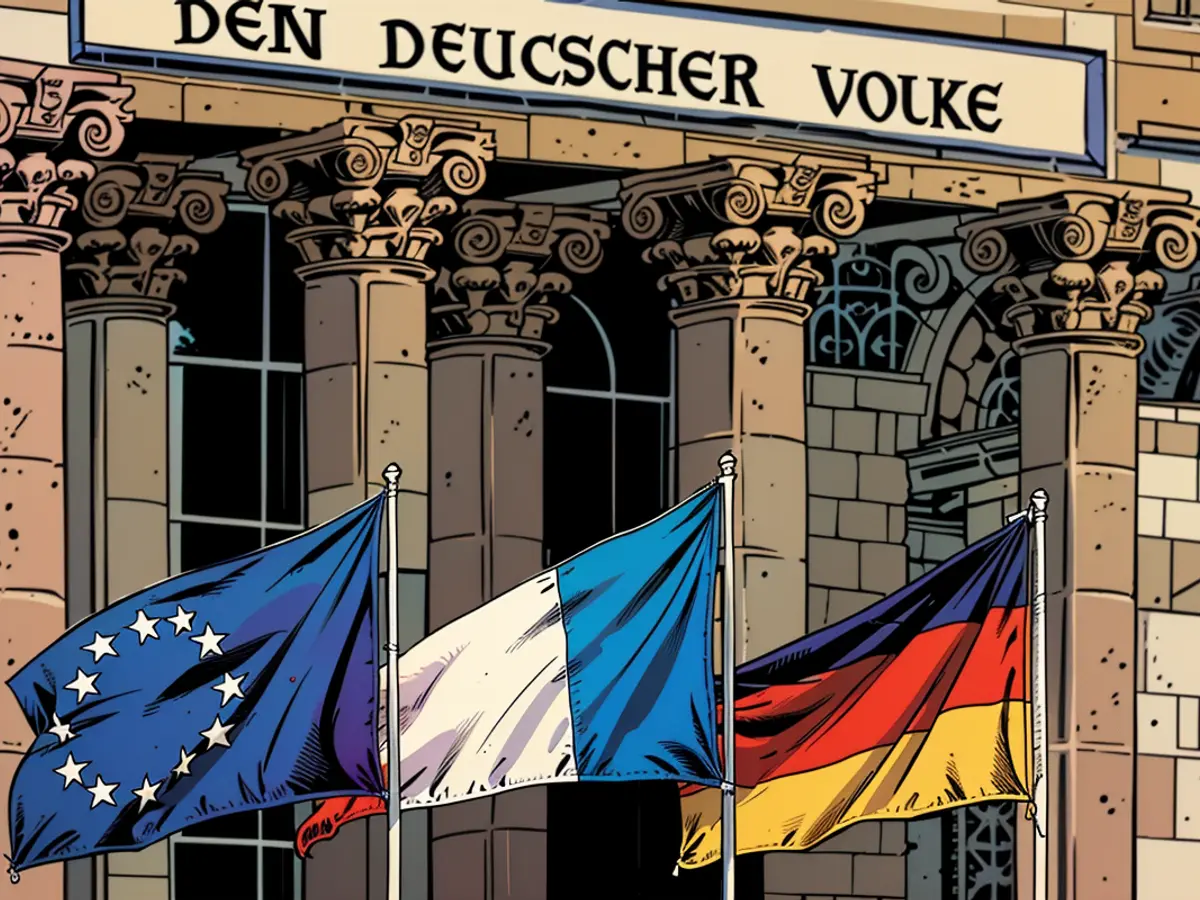French election result worries German politicians - criticism of Macron
"We work closely and trustfully with France, our most important partner in Europe, as stated by Government Spokesperson Steffen Hebestreit. And that's how it's supposed to be." Hebestreit refused to comment on the election results with reference to the second round of voting coming up this coming Sunday. Baerbock stated, "Germany and France bear a special responsibility for our common Europe."
Representatives from parties and factions expressed their concerns openly. "The radical right have received one third of the votes," said the Green European politician Anton Hofreiter to AFP. "That's alarming, but no majority." Hofreiter had expected an even worse result.
CDU General Secretary Carsten Linnemann stated that the realignment of politics in Paris would "fundamentally change" the relationship with Germany and "heavily burden" it. SPD leader Saskia Esken interpreted the result as part of a "rightward shift in Europe," which poses a danger to cohesion and prosperity.
There was widespread concern in Berlin about a fateful miscalculation by French President Emmanuel Macron, who scheduled the new election only three weeks after his party's poor showing in the European elections.
"I believe that the behavior of the French president was unwise," said FDP General Secretary Bijan Djir-Sarai. Green leader Ricarda Lang told Politico that Macron had "probably contributed more to a strengthening of the far-right." She reminded the traffic light parties of their great responsibility "in a time when many European countries are becoming more unstable."
Macron's call for early elections was described as a "definite blunder" by SPD Foreign Policy spokesperson Nils Schmid in an interview with Tagesspiegel. "It was a defeat with an announcement, and it's still unclear why he dissolved parliament prematurely." Macron had "thus opened the doors of power wide for the far-right."
As a consequence of a government change in Paris, Germany could face a greater responsibility in Europe, said Green MP Hofreiter to AFP. He would already be asked about German responsibility during his travels in Europe, said the chairman of the European Affairs Committee in the Bundestag. "And that could get even worse."
SPD Foreign Policy spokesperson Michael Roth sees a co-responsibility of the German government for the strong showing of the right-populist party Rassemblement National (RN) in the French parliamentary election on Sunday. "We asked ourselves too little about how we can better support the pro-European, liberal President Macron," said the chairman of the Foreign Affairs Committee to Politico. "We take too little account of political debates and problems in other countries."
The alternative to Macron is "not Sarkozy anymore, but a strict right-wing nationalist like Marine Le Pen." Should she take power, it would have dramatic consequences for Germany, warned Roth. "France is the heart of united Europe. If this heart no longer beats powerfully, the EU could suffer a stroke."
The right-populist party Rassemblement National (RN) came in first place in the first round of the French parliamentary election on Sunday with approximately 33 percent of the votes. The left-green alliance New Popular Front came in second place with about 28 percent. The government coalition of President Emmanuel Macron trailed in third place with just under 21 percent of the votes.
- Steffen Hebestreit, the Federal Government's spokesperson, emphasized Germany's close partnership with France, its most significant partner in Europe.
- Anton Hofreiter, a Green European politician, voiced concern about the third of votes received by the radical right in France.
- Carsten Linnemann, the CDU's general secretary, predicted that a change in politics in Paris would significantly alter Germany's relationship with France.
- The SPD leader, Saskia Esken, perceived the result as part of a shift towards the right in Europe, which poses a threat to unity and prosperity.
- Emmanuel Macron's scheduling of the new election three weeks after the European elections' poor showing raised concerns in Berlin.
- FDP General Secretary Bijan Djir-Sarai criticized Macron's decision to call for early elections, stating it was a "definite blunder."
- Green leader Ricarda Lang believed Macron's actions may have contributed to the far-right's strengthening.
- SPD Foreign Policy spokesperson Nils Schmid viewed Macron's dissolution of parliament prematurely as a defeat with an announcement.
- Hofreiter mentioned that Germany could face a more significant role in Europe due to a government change in Paris, raising concerns during his European travels.
- Michael Roth, the SPD's Foreign Policy spokesperson, admitted the German government's co-responsibility for the strong showing of the right-populist Rassemblement National (RN) in France.
- Roth warned of the dramatic consequences for Germany if Marine Le Pen, the leader of RN, gained power in France, as the heart of united Europe.
- The right-populist RN secured the first place in the first round of the French parliamentary election with approximately 33% of the votes.







